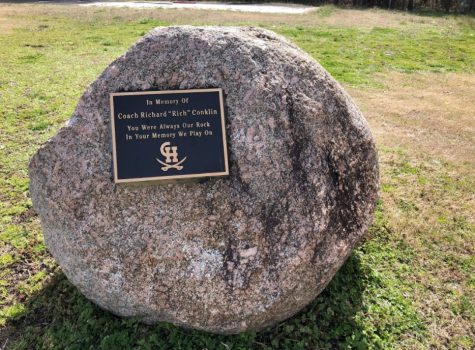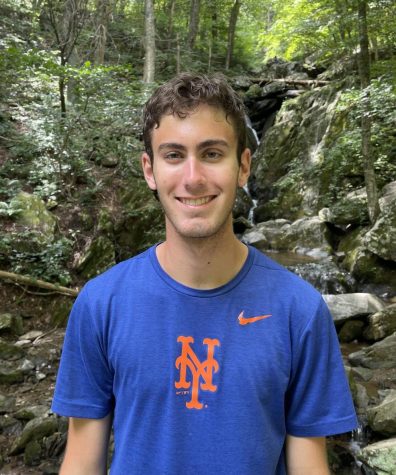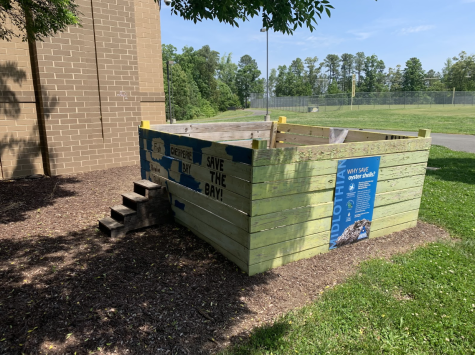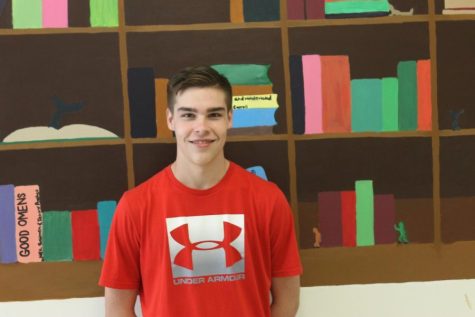Nonprofit aims to curb Colorectal cancer with help of Clover Hill students
Runners wave during Hitting Cancer Below the Belt’s Boxer Brief 5k in Richmond. The event raises money for colorectal cancer prevention.
Hitting Cancer Below the Belt (HCB2) is an organization dedicated to education about and prevention of colorectal cancer, offering local high school students a chance to advocate for the cause through their Junior Board.
On March 17, HCB2 will be on campus from 5 to 7 p.m. during the girls’ soccer game. With them they will bring their message about the importance of understanding colorectal cancer, the second most deadly form of cancer in the United States. Colorectal cancer is a broad term that describes cancer originating in the digestive system, specifically in the colon or rectum.
Junior Henry Yang is a member of the HCB2 Junior Board, and he believes that it is a great way for him to serve the community while learning about health.
“You’re helping inform people about gut health and how to prevent [colorectal cancer] and it’s just overall good for your personal life as well,” Yang said.
Executive Director Melinda Conklin founded the group in 2013 after her husband, former Clover Hill football coach Rich Conklin, passed away from the disease two years earlier. She started with the goal of raising awareness.
“I knew that nobody was talking about colorectal cancer,” Conklin said. “There’s not enough conversation about this disease.”
Now, HCB2 provides a number of services to the state as a colon health and colorectal cancer prevention nonprofit.
“Primarily what we do is we provide access to timely screening, which means we fund screening programs [for the detection of colorectal cancer],” Conklin said. “We provide nutrition to cancer patients. And then we have an array of different ways that we provide education, whether it’s podcasts, blogs, social media posts, presentations and the appearance with our inflatable colon.”
According to Conklin, HCB2’s mission is to break the silence surrounding colorectal cancer, as it is not one of the most well-known or discussed cancers.
“It is the second [largest] cancer killer in our country, and in men and women,” Conklin said. “So getting information out, breaking through misconceptions [and] making sure that people understand about screening, the prep, about screening options, the symptoms, and how to talk to your doctor. That sort of thing is just so critically important, and nobody was doing that [before HCB2].”
One of Conklin’s main concerns about the disease is its sharp rise in younger people in recent years.
“[The American Cancer Society is] saying right now that by 2030 colorectal cancer will be the number one cancer killer in people under the age of 45,” Conklin said. “Anybody born after 1990 is four times more likely to be diagnosed with rectal cancer and two times more likely to be diagnosed with colon cancer. So there’s data showing that it’s a big issue.”
According to Conklin, the prevailing belief among scientists and doctors is that the increased amount of carcinogens that people encounter in their daily lives in today’s society is the cause of the rise in colorectal cancer. She lists Monsanto’s Roundup weed killer and added sugars as examples of substances that are linked to cancer.
“We’re thinking that it’s the toxins in our air, our food, and our work,” Conklin said. “You’re looking at an overdose of antibiotics, and you’re looking at extra sugar.”
Helping young people avoid the disease is the purpose of the Junior Board. It consists of students representing four local, Richmond area high schools: Clover Hill, James River, Douglas Freeman, and Maggie Walker. Their goal is to educate young people about gut health and how to prevent colorectal cancer.
“The first step is educating the young people to just kind of pay attention to what we’re actually consuming,” Conklin said. “Secondly, obviously is what signs and symptoms not to ignore such as blood in your stool, chronic constipation, irregular bowel habits, thin stools, pain, bloating, straining, and all this kind of stuff. And again, breaking the silence and providing really basic information about what a colon is, and why it is important to protect it.”
Yang and fellow Clover Hill Junior Eric Zheng hang flyers around the school and promote gut health. They also attend events such as the Boxer Brief 5k in June. Zheng encourages students to join the Junior Board and support HCB2 in their mission while earning community service hours.
“I feel like this, it’s a small group [where] you have to do something to contribute,” Zheng said.
Conklin’s advice for high school students is to pay attention to their gut health and seek medical help if they are experiencing issues. She emphasizes that while most of these issues are not signs of colorectal cancer, it is still important to be vigilant.
“Listen to your gut if it is talking to you [or if it is] not functioning well,” Conklin said. “Either come and have a conversation with us [or] have a conversation with your parents. And let’s figure out why.”
Interested students can email Conklin at [email protected] to join. The Junior Board is divided into three different committees. There is the event committee, which volunteers at HCB2’s events. The education committee creates content with the goal of educating high school students about colorectal cancer prevention. Finally, the marketing committee takes the products of the education committee and makes them into flyers and infographics to get them out to the public.


Ben is a senior in his third year of writing for the Cavalier Chronicle and his second as an editor. His love for writing led him to join the staff, and...







